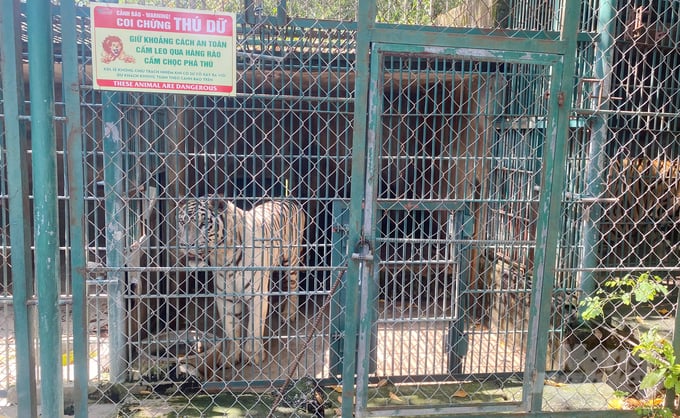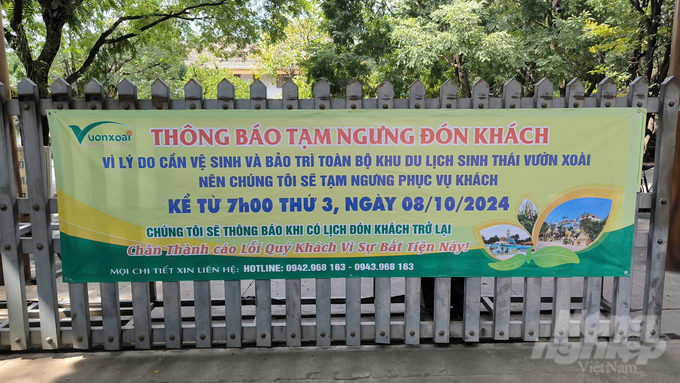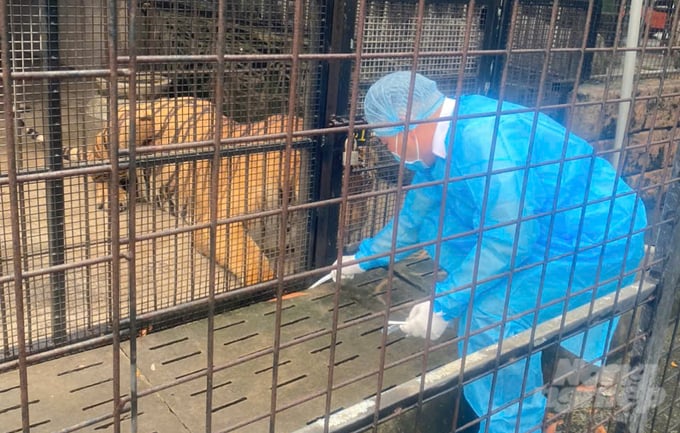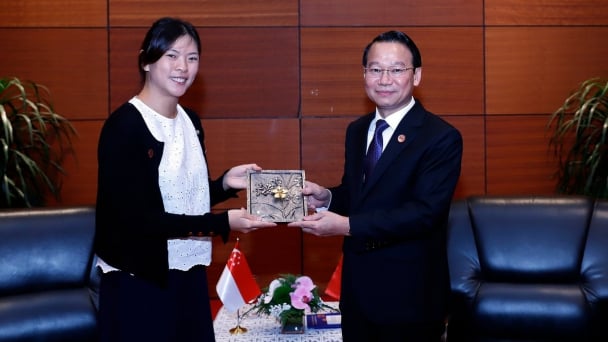April 18, 2025 | 19:48 GMT +7
April 18, 2025 | 19:48 GMT +7
Hotline: 0913.378.918
April 18, 2025 | 19:48 GMT +7
Hotline: 0913.378.918
“We fumble because we have never thought of it”. That was the comment of Nguyen Truong Giang, Head of Dong Nai Sub-Department of Livestock Production and Animal Health, when assessing the case of 20 tigers and 1 leopard dying in Mango Garden Ecotourism Area in Bien Hoa city. These animals were recorded dead around September 8 and September 22. The results of the test confirmed that these wild animals all died due to being positive for the A/H5N1 avian influenza virus.

The death of 20 tigers and 1 leopard due to A/H5N1 avian influenza in Dong Nai is an unprecedented event in Vietnam. Photo: Le Binh.
This news came as a shock not only for the provincial veterinary sector but also experts in the country. Nguyen Truong Giang affirmed that Dong Nai has controlled the avian flu epidemic quite well. "Dong Nai has built a safe area for the flu epidemic, and regular tests have also shown that the virus has not circulated in the area for many years. The problem is to identify the source of the infection, find the cause, and have a plan to handle and prevent it in the future," he said.
Dong Nai Sub-Department of Livestock Production and Animal Health has deployed many sampling sessions of specimens and environment to assess the density of virus load in the epidemic area. The veterinary force also took 70 samples from other animals susceptible to avian influenza in Mango Garden Ecotourism Area such as silver pheasants, Vietnamese peacocks, Indian peafowls, parrots, flamingos, Siamese fireback, mandarin ducks, and golden pheasants, but all test results were negative.
Dong Nai People's Committee also gave out directives to trace the origin of the food source for the tigers and leopards at Mango Garden. Although the units have not yet provided uniform numbers during the period of August 6 to September 6, the units have presented sufficient invoices and documents for purchasing chicken meat products as per regulations.
Through testing, no trace of the A/H5N1 virus was detected in the food samples. According to the staff in charge at the Mango Garden Ecotourism Area, all wild animals use the same food source and only 20 tigers and 1 leopard died from infection.
From late August to September 16, My Quynh Safari (Long An province) had 30 tigers and lions die. The cause was determined to be the A/H5N1 avian influenza virus. Due to the shortage of tigers, My Quynh Safari agreed to import 6 tigers from Mango Garden Ecotourism Area to supplement the herd. During the process, staff from the two units also visited each other's area to survey and evaluate.
“Genetic sequencing of the tigers, leopards and lions that died at My Quynh Safari (Long An Province) and Mango Garden Ecotourism Area showed that they had the same origin and genetic code. We can not rule out the possibility that both places have the same source of infection. However, it is still too early to confirm where the source of infection came from and who infected whom,” said Nguyen Thi Diep, Head of Epidemiology Office (Department of Animal Health).

Mango Garden Ecotourism Area is temporarily closed to ensure the safety of wild animals and visitors after the deaths of tigers and leopards. Photo: Le Binh.
Mango Garden Ecotourism Area has always been known as an attractive destination and also a miniature zoo of Dong Nai. Mango Garden currently has 68 species of wild animals with 748 individuals, with full records of import origin, breeding at the wildlife park, exchange and transfer.
“Because rare individuals are in large numbers, the company has always focused on disease prevention throughout the past time. The health of the animals is monitored 24/7 by the company's veterinarian. The proof is that when veterinary staff discovered tigers and leopards with abnormal symptoms, they immediately provided treatment using antibiotics, antivirals and antipyretics. However, they only managed to save half of the tigers in this flu attack,” said Ngo Van Sang, Director of Mango Garden Ecotourism Company Limited.

Veterinary staff are taking samples from live tiger cages at Mango Garden Ecotourism Area to assess the virus load after the incident. Photo: Le Binh.
The “tornado” called A/H5N1 not only swept through businesses in a flash, but it also left behind a mess and many question marks for the veterinary force of Dong Nai province. Many people still do not understand how the barrier of disease prevention and control against avian influenza in Dong Nai was penetrated.
Head Nguyen Truong Giang also admitted that the epidemic came too quickly and suddenly. Even when receiving information about the first tigers dying, the veterinary force was quite confused. This was something no one had thought of, something that had never happened nationwide.
"We had to stabilize soon, focus on taking samples, instruct businesses to protect wild animals and trace the origin of disease to prevent widespread. Fortunately, the epidemic was put under control and no more unfortunate cases were recorded," said Giang.
It is fortunate that livestock farming is not allowed in Bien Hoa city according to the planning of Dong Nai People's Committee. This does not affect the disease-free zone, and the source of the disease becomes easier to locate.
As for areas surrounding Mango Garden Ecotourism Area such as communes in Trang Bom district, Dong Nai Sub-Department of Livestock Production and Animal Health has sped up the process of taking samples at markets, slaughterhouses, and livestock farms to promptly detect the source of the disease if there was any. From there, the province will come up with plans to handle the disease in a timely manner.
Translated by Samuel Pham

(VAN) On the afternoon of April 17, Prime Minister Pham Minh Chinh chaired the closing ceremony of the P4G Vietnam Summit 2025, with the theme 'Sustainable and People-Centered Green Transformation.'

(VAN) Vietnam and Singapore are poised to sign the Paris Agreement and collaborate on implementing large-scale renewable energy projects that are mutually beneficial.

(VAN) Vietnam and Rwanda agreed to promote agricultural and environmental cooperation towards green growth and sustainable development in the new period.

(VAN) With a comprehensive food system transformation roadmap, Ethiopia has become Africa's largest wheat producer, ensuring domestic consumption and export.

(VAN) On the morning of April 17, Deputy Minister of Agriculture and Environment Phung Duc Tien welcomed and worked with Mr. Gennady Bezdetko, Ambassador Extraordinary and Plenipotentiary of the Russian Federation to Vietnam.

(VAN) On the afternoon of April 17, Deputy Minister of Agriculture and Environment Phung Duc Tien received with UNIDO Deputy Director-General Fatou Haidara.

(VAN) The International Fund for Agricultural Development (IFAD) is proud to stand alongside the Ministry of Agriculture and Environment in the journey towards green transformation.